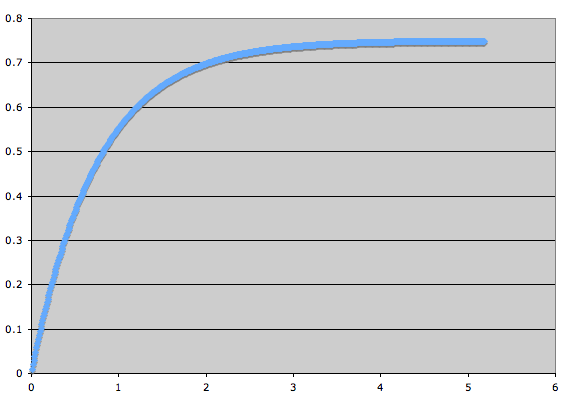
Assignments for Monday's class:
Take-home exam is due in Monday BEFORE class. A printed copy is preferred.
How does the relationship between observed sequence divergence (p) and substitution events (d) change, when the different bases (or aa) do not occur with the same frequency?
Given a substitution rate of 10^-8 per year and nucleotide, how many substitutions would have occurred in two sequences that had a common ancestor 200 million or 1 billion years ago. Assuming a concentration of 25% per nucleotide, what would you expect for the % sequence identity of the two sequences (ignoring sequence alignment.)
Glance through http://en.wikipedia.org/wiki/Database_models with emphasis on flatfile and relational models
Read through http://en.wikipedia.org/wiki/Entrez
Glance through http://www.ncbi.nlm.nih.gov/books/NBK3837/ to get an idea of what entrez offers
Old homework:
Here is how I envisioned the answers, Jukes Cantor spreadsheets are here)
Jukes Cantor relationship (observed difference p versus number of substitutions d) for nucleotides. (A derivation is here).

Feedback loops in GAIA - subsystems can evolve by natural selection
What are alternatives to evolution by natural selection?
How does an evolutionary frame work help to
- find genes
- find important non protein coding regions in the genome
- find the function of a hypothetical conserved protein?
In biological evolution, what processes might go beyond natural selection?
Do these processes conflict with "Darwinian evolution" or only with the modern synthesis?
- gene transfer
- selfish genetic elements / molecular parasites
- fusion of lineages (e.g., eukaryotes, lichen)
- group selection
- non-random mutations
- directed mutations
- mutationism (big jumps due to mutations, aka Hopeful Monsters)
- genetic drift
- gratuitous complexity / neutral pathways towards complexity
Natural Selection and EvolutionWhen does "evolution" occur? An algorithmic approach."Darwin's Dangerous Idea" by Daniel C. Dennett, Chapter on Evolution as algorithm is a reading assignment for Monday, Sept. 13. [available through WebCT]What is needed for evolution to occur?(Note, this is different from stating that this is all that occurs in evolution)
What processes in biological evolution go beyond inheritance with variation and selection? (We'll discuss many of the following later in the semester.)
|
Go through coral of life ppt slides.
In the unlikely event that we still have time: slides on sequence space here